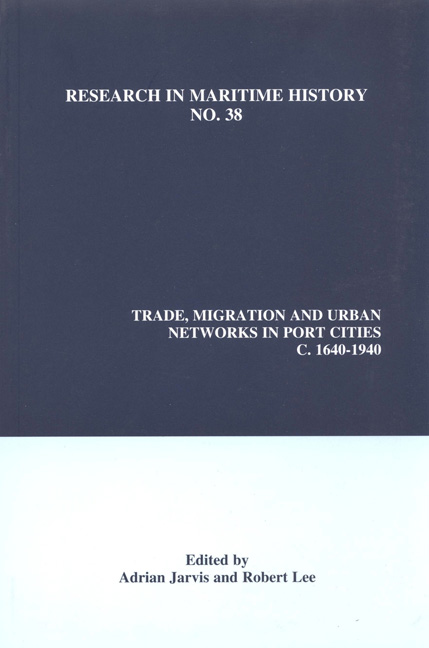Book contents
- Frontmatter
- Table of Contents
- Contributors' Notes
- “Trade, Migration and Urban Networks, c. 1640-1940: An Introduction”
- “Portuguese Jews in Amsterdam: An Insight on Entrepreneurial Behaviour in the Dutch Republic”
- “Contrasting Merchant Communities in the Early Eighteenth Century: Stockholm, Calabar and Charleston”
- “Integration of Immigrant Merchants in Trondheim in the Seventeenth and Eighteenth Centuries
- “In the Eye of the Storm: The Influence of Maritime and Trade Networks on the Development of Ostend and Vice Versa during the Eighteenth Century”
- “Exploiting International Webs of Relations: Immigrants and the Reopening of the Harbour of Antwerp on the Eve of the Nineteenth Century”
- “Migrants, Merchants and Philanthropists: Hierarchies in Nineteenth-Century Greek Ports”
- “Port Cities, Diaspora Communities and Emerging Nationalism in the Ottoman Empire: Balkan Merchants in Odessa and Their Network in the Early Nineteenth Century”
- “Combining Business and Pleasure? Cotton Brokers in the Liverpool Business Community in the Late Nineteenth Century”
“Portuguese Jews in Amsterdam: An Insight on Entrepreneurial Behaviour in the Dutch Republic”
- Frontmatter
- Table of Contents
- Contributors' Notes
- “Trade, Migration and Urban Networks, c. 1640-1940: An Introduction”
- “Portuguese Jews in Amsterdam: An Insight on Entrepreneurial Behaviour in the Dutch Republic”
- “Contrasting Merchant Communities in the Early Eighteenth Century: Stockholm, Calabar and Charleston”
- “Integration of Immigrant Merchants in Trondheim in the Seventeenth and Eighteenth Centuries
- “In the Eye of the Storm: The Influence of Maritime and Trade Networks on the Development of Ostend and Vice Versa during the Eighteenth Century”
- “Exploiting International Webs of Relations: Immigrants and the Reopening of the Harbour of Antwerp on the Eve of the Nineteenth Century”
- “Migrants, Merchants and Philanthropists: Hierarchies in Nineteenth-Century Greek Ports”
- “Port Cities, Diaspora Communities and Emerging Nationalism in the Ottoman Empire: Balkan Merchants in Odessa and Their Network in the Early Nineteenth Century”
- “Combining Business and Pleasure? Cotton Brokers in the Liverpool Business Community in the Late Nineteenth Century”
Summary
In the last ten or fifteen years an increasing number of studies have appeared on entrepreneurs and entrepreneurship in the early modern period. Dutch economic and social history has followed this trend, and a good range of micro and macro-level research has been published in both Dutch and in English. Indeed, the Dutch contribution to the analysis of businessmen and the business environment in the United Provinces during the Republic has been quite broad. Scholars have dedicated most of their efforts to investigating business activities, investment preferences, production priorities and the socio-economic networks of entrepreneurs between the end of the sixteenth and the beginning of the nineteenth century. Dutch historiography has shown a clear preference for research on the traditional Dutch entrepreneur, men involved in the establishment, development and growth of the Dutch economy during the early modern era. Research in general has favoured native Dutch businessmen, immigrant groups (such as merchants and artisans from the Southern Netherlands or the French Huguenots) and Dutch entrepreneurship abroad.
Thus far, Dutch and international studies on early modern entrepreneurship in the Republic have failed to integrate fully one very important immigrant group – the Sephardic Jews of Portuguese origin. Existing studies of this particular group have focused either on its religious nature or its particularities. No effort has been made to establish the extent to which the Portuguese Jewish entrepreneur in the United Provinces actually shared business values and strategies with his Dutch counterparts.
The Portuguese Jewish community of Amsterdam was the result of a long-standing migration initiated when Spain expelled the Jews in 1492. Most of the Jewish families who fled the Spanish kingdoms crossed the border into Portugal to begin new lives. Others left for various cities in the Mediterranean and North Africa. Many of the Portuguese and Spanish Jews actually remained in Portugal, although they had been forcefully converted to Christianity by the end of the century on the initiative of the king of Portugal and were henceforth named “New Christians.” It was only with the coming of the Portuguese Inquisition during the sixteenth century that many were forced to leave the kingdom and settle elsewhere in Europe.
- Type
- Chapter
- Information
- Publisher: Liverpool University PressPrint publication year: 2008



